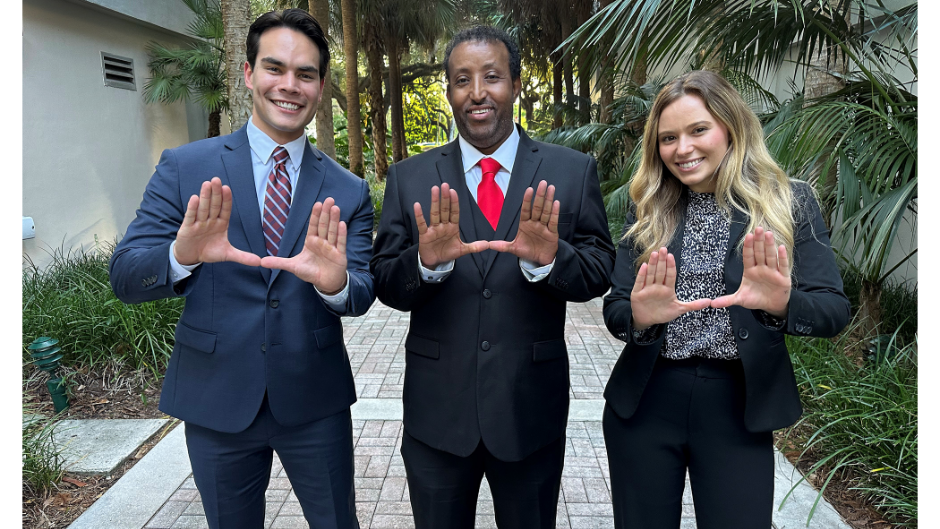7:1
With 380+ faculty members, Miami Law offers smaller classes with more opportunities for interaction with faculty and other students.
At University of Miami School of Law your course of study is open to whatever fuels your interest. With an unusually broad law curriculum – 300+ courses and 18 areas of study - you can prepare for success in any field and turn your legal area of interest into practice.
The three-year Juris Doctor degree curriculum gives you a solid foundation in legal analysis, critical thinking, and practical lawyering skills to become an exceptional lawyer for today’s truly, global market while acquiring the professional skills you need no matter where your education takes you.
Miami Law also offers premier practical experience: our students are able to use their abilities to help real clients through clinics, externships, and field placements.
Miami Law offers a mix of qualities no other school can match: a tight-knit community with vast curricular options nestled in Coral Gables, FL right on the 240-acre campus of a nationally acclaimed university; excellent employment outcomes from one of the most global J.D. programs in the country; and the chance to spend your law school years in Miami, one of the most dynamic cities in the U.S.
The unique introductory program helps first-year students master the technical aspects of the law as a basis for understanding its theory and substance. Electives are available as soon as the spring of your 1L year.1L Year

Contracts or Property (4 Credits) Property Torts (4 Credits) It analyzes the public policy positions implicit in the legal concepts that courts use in tort cases, as well as the ways in which social problems and the law of torts interact. Civil Procedure (3 Credits) An introduction to the process of civil litigation, emphasizing questions of jurisdiction, pleadings, discovery, remedies, and appellate review. In addition to the above traditional, required first-year courses, all entering students also take: Elements of Law (3 Credits) Legal Communication & Research Skills I (2 Credits) In the fall, new law students are introduced to foundational lawyering skills. They learn to read judicial opinions, analyze the law, and then apply the law to a set of facts. Students write objective legal memoranda of the type that a junior associate or judicial clerk might be asked to write. They also learn how to communicate with clients. Learn More
Contracts
Examines the purpose and scope of the legal protection accorded agreements. The course focuses on:
Focuses on basic principles governing private and public control over tangible and intangible resources, especially land. The course addresses concepts and policies concerning property and special concepts concerning real estate, such as estates in land, future interests, and the rule against perpetuities. The course also studies real estate transactions, recording, methods of title assurance, easements, covenants, and land use controls.
Considers the issues involved in assessing whether the law should require a person to compensate another for harm intentionally or unintentionally inflicted.
Focuses explicitly on legal institutions, the theories underlying them, the process of legal reasoning and the ways in which the law evolves.
Contracts or Property (4 Credits) Property Criminal Procedure (3 Credits) An introduction to the criminal process with special emphasis on constitutional issues. It covers arrest, interrogation, search and seizure, the right to counsel and related topics. U.S. Constitutional Law I (4 Credits) A study of the American constitutional system, concentrating on the idea of judicial review, relationships among the three branches of government, and allocations of responsibility between federal and state governments. Elective (3 Credits) Second-semester students choose an elective from a list of courses for first-year students. These courses deal with regulatory issues, statutory law, international and comparative law, and other matters of law not generally available in the traditional first-year program. The following are representative of the elective course offerings from spring 2023: Trusts & Estates Legal Communication & Research Skills II
Contracts
Examines the purpose and scope of the legal protection accorded agreements. The course focuses on:
Focuses on basic principles governing private and public control over tangible and intangible resources, especially land. The course addresses concepts and policies concerning property and special concepts concerning real estate, such as estates in land, future interests, and the rule against perpetuities. The course also studies real estate transactions, recording, methods of title assurance, easements, covenants, and land use controls.
Systemic Advocacy
Jurisprudence
Environmental Law
Business Associations
The Future of Law Practice
International Law
Substantive Criminal Law
This course, in the spring, shifts to persuasive writing and advocacy, and students work on a litigation matter from filing to appeal.
Miami Law has a wealth of options to help students move beyond the classroom into the word of practice. Clinical Program Every law school has its unique culture and personality, and we encourage you to get to know ours a little better:
Miami Law students receive a broad-based legal education, and in their 2L and 3L years have the option to concentrate on special areas of interest through programs, concentrations, joint degrees and experiential learning options. In contrast to the first-year curriculum, there are no required courses during a law student’s second and third years of study but there are requirements that must be met. Accordingly, after the first year, the list of courses, seminars and workshops offered is extensive. and this includes innovative short courses to explore niche areas and stay on the pulse of the latest developments in the law.Areas and Fields of Study

Concentrations and Joint Degrees
Clinical and Experiential Education
Externships
Study Abroad
Pro Bono
Moot Court
Start Your Application Journey - Get to Know Us Better
Meet With Admissions
See Our Recruitment Calendar
Schedule a Visit
View a Prospective J.D. Webinar
Take a Virtual Tour